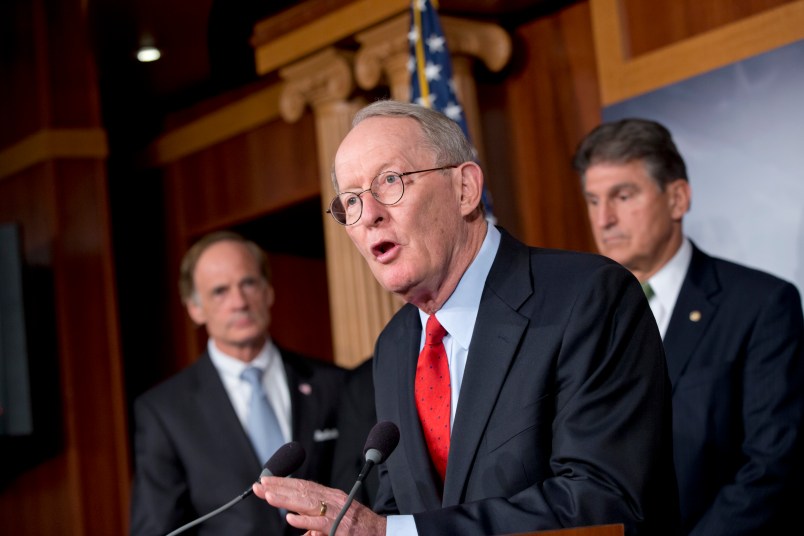A key Republican senator in the GOP’s effort to repeal Obamacare signaled that he was on board for the party’s repeal-and-delay plan, but stressed that “the sooner we can come up with a replacement the better.”
“Our goal is to repeal Obamacare, have a transition period, and then replace it,” Sen. Lamar Alexander (R-TN), the chair of the Senate Heath, Labor, Education, and Pensions Committee, told reporters on Capitol Hill Tuesday. “And to do that in an orderly, sensible way that helps people and doesn’t hurt them.”
Alexander previously cautioned that the repeal-and-replace effort could take “several years.” Lawmakers have since begun to coalesce around a plan that would repeal Obamacare through a fast-track process known as reconciliation, which only needs a majority vote in the Senate, but delay the effective date of the repeal for two to three years to give Congress time to come up with a replacement.
Health policy experts, including some conservatives, have warned that such a plan would still risk chaos on the insurance markets, as carriers would have little incentive to sell in the ACA exchanges they knew were doomed. The repeal-and-delay plan would also likely depend on getting Democratic support for the eventual alternative, which it is believed would need 60 votes to pass.
Alexander said Tuesday he hoped Democrats would be willing to support a replacement plan.
“For six years we’ve been sort of fighting like the Hatfields and the McCoys. It’s been very partisan and we see what happens, we don’t have a success,” he said. “So I think in the end we ought to do our best to build a consensus so that we can have a lasting solution.”
He also expressed GOP openness to measures that would encourage insurers to stay in the marketplaces while an alternative plan was in the works, including those Republicans have opposed in the past.
“We will probably have to do some things in that transition of a couple of years that we wouldn’t do on a permanent basis,” he said. He demurred when asked whether that includes provisions funded by federal taxpayer dollars. (Under President Obama, Republicans railed against the ACA risk corridors provisions and other market stabilizers claiming they were taxpayer-financed “insurer bailouts.”)
“We are only talking about a very small part of the market. Only about 4 percent of the American people have subsidies to buy insurance on the Obamacare exchanges. And the entire individual market is only 6 percent, so that’s where most of the headlines are coming from,” Alexander said. “So I think we will have to have a transition period for that part of the market, that makes it likely that insurance companies would be willing to sell into the individual market, so Americans will have insurance they can buy.”
Asked by TPM whether the individual mandate would be repealed right away, as it was in the test run of an Obamacare repeal Republicans did in 2015, while other parts of the ACA repeal are delayed, Alexander said, “We’re still working that out.”
“We want to get started right away and it will probably take a good while to finally implement it, although I think the sooner we can come up with a replacement the better,” he said.







I’m looking for an appropriate response here … “FUCK YOU ASSHOLE!” seems understated.
It seems that the only real complaint that the R’s have continues to be the ACA was passed under President Obama’s guidance. They have never, to the best of my knowledge, been specific as to their complaints and seem to be embracing more and more of the program as time goes by.
So your replacement is gonna replace WHAT, precisely, and why? Which leg of this three-legged stool do you want to get rid of?
And, I might add, passed without a SINGLE REPUBLICAN VOTE. Maybe that pisses them off too. Not that President Obama didn’t try his damnedest to meet them halfway on something.
Lawmakers have since begun to coalesce around a plan that would repeal Obamacare through a fast-track process known as reconciliation, which only needs a majority vote in the Senate, but delay the effective date of the repeal for two to three years to give Congress time to come up with a replacement.